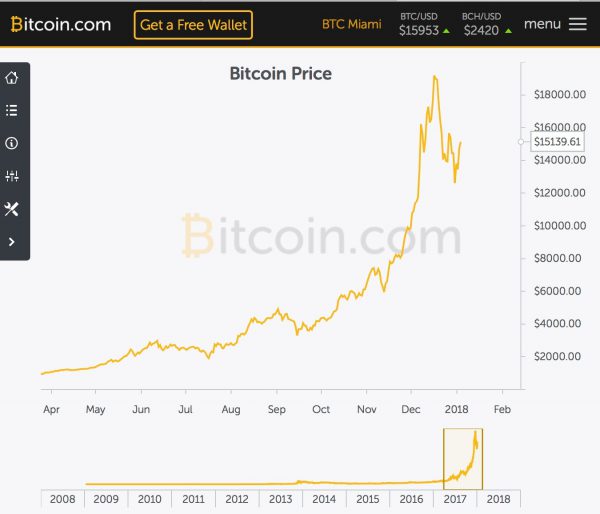As a real estate broker or MLS executive who is reading headlines like “Man Buys Texas Estate with Bitcoin,” you may be scratching your head to understand what this stuff is all about. Here is a primer that may help you to understand it.
First of all, a cryptocurrency is a digital currency. It is not a coin or a bill. It is not backed by any nation’s treasury. It has a theoretical value that can be used for the exchange of goods and services. Bitcoin is only one of the digital currencies. There are many. In fact, anyone can create a digital currency in a few hours. Bitcoin is the largest and most widely known currency. Ethereum and Litecoin are gaining in popularity.
Cryptocurrencies are a form of money that can be used for payment. It is nothing more, and nothing less. Funny thing is, we do not read headlines like “Woman Buys New York Penthouse with Pesos.” However, to all extents and purposes, the Bitcoin transaction and Peso transaction are effectively the same, you exchange one currency for US Dollars. But there is one catch that you need to understand.
Currencies that we are familiar with are naturally attached to sovereign nations like the Dollar in America. When you want to use your American Dollar in some other nation, you need to exchange your currency for the currency of that nation. Exchange is the very nature of why currencies exist.
In housing, people exchange currencies for property all of the time. Since housing is marketed here in America in US Dollars, if a seller wants to get paid in Bitcoin, then the buyer will need to use a cryptocurrency exchange like Coinbase to convert dollars into Bitcoin. Similarly, if a buyer has Bitcoin and the seller wants US Dollars (which is assumed), then the exchange will be used to move Bitcoin to dollars.
 Cyber currencies are not controlled by any bank or government. To all extents and purposes, the currency is established by a group of people mutually agree to its value and it trades on the open market like any currency with bids and asks. High risk investors are driving the market more than the use of Bitcoin for products and services. On April 3rd of 2017, Bitcoin was valued at about $1000 per theoretical Bitcoin, a relative value that was stable and lasted from 2009 to 2017. The media began to cover cryptocurrencies and investors started to take notice. As awareness grew, so did demand, causing hyperinflation in the value of a Bitcoin. The run-up peeked at $19,210 on December 12th, 2017. Between the 12th and the 30th, Bitcoin value dropped down to $12,619. We asked our financial advisor about investing in cryptocurrencies in the fall and were advised against it – to high of a risk – Vegas odds are better. We listened and did not invest, and we are still out. We are not high-risk investors or day traders, but it would have been a big win. Bummer.
Cyber currencies are not controlled by any bank or government. To all extents and purposes, the currency is established by a group of people mutually agree to its value and it trades on the open market like any currency with bids and asks. High risk investors are driving the market more than the use of Bitcoin for products and services. On April 3rd of 2017, Bitcoin was valued at about $1000 per theoretical Bitcoin, a relative value that was stable and lasted from 2009 to 2017. The media began to cover cryptocurrencies and investors started to take notice. As awareness grew, so did demand, causing hyperinflation in the value of a Bitcoin. The run-up peeked at $19,210 on December 12th, 2017. Between the 12th and the 30th, Bitcoin value dropped down to $12,619. We asked our financial advisor about investing in cryptocurrencies in the fall and were advised against it – to high of a risk – Vegas odds are better. We listened and did not invest, and we are still out. We are not high-risk investors or day traders, but it would have been a big win. Bummer.
Broker Cryptocurrency Strategy
This is simple. The chief benefit to any brokerage today is the public relations value. If you want to get a headline, announce that you will accept cryptocurrency for a property. Of course, if you plan to make the announcement, then you will need to be able to do it. WAV Group can help your brokerage create an account on one of the Crytpocurrency exchanges. I mentioned Coinbase above. There are many others, like Bitstamp, kraken, Poloniex, or Bitfinex. The choice of exchange platform is driven by two variables. We need to know the cryptocurrency and the exchange that your customer is on. From there, we can set up your account and the customer can exchange their cryptocurrency into US Dollars.
Will Cyber Currencies Continue to Emerge?
Yes. Cryptocurrency will continue to emerge, even though they are in their early days. Many countries around the globe has currencies that are as unstable as Bitcoin. By and large, people of wealth who live in those nations, especially the businesses in those nations that do a lot of import and export, need to find safe harbor for their money that is beyond the reach of government. A common example is Russian businessmen banking in real estate in New York City, or the Chinese businessmen banking in property in California. Heck, the world’s wealthy have often banked in land, art, precious stones, et cetra, to avoid the reach of government and to diversify assets out of stocks and currencies.
We are all familiar with the historic collapses of the US economy in 1929 (down 22% in one day), prolonged recession in 1980s, savings and loan issues in the 90s, dot com bust in 2000, September 11th, housing crisis, et cetra. There is no immunity from risk, but cryptocurrencies do provide a form of freedom by escaping the reach of governments….. of course, that is unless the government like China blocks access to the Internet websites where you access your cyber accounts – yikes! If you thought that the drive to the ATM is inconvenient – imagine needing to get on an airplane to find an Internet connection to access your cyber currency account.
In closing, I reached out to Ken Jenny – a veteran real estate executive and consultant – to get his take on the noise about cryptocurrencies. According to Jenny, “The only certainty about bitcoin as a currency is that you have to pay for it with real money. Other than that, the rest is unknown.”





Victor,
It has been some time since we last met or spoke. I trust you, Marilyn and the family are doing well. After transitioning Kurio to Corelogic in 2014 we have been out of the real estate tech scene. When I saw your email regarding cryptocurrency I was intrigued though. My consulting firm, Galpin Capital is currently representing groups in Canada and China that would comprise a very large portion of the cryptocurrency mining activity going on. The reason we represent these groups is our relationships with many of the key software developers and VC firms in this space.
While I understand that Bitcoin and other cryptocurrencies along with Initial Coin Offerings have received an over abundance of media attention lately, the attempts by the real estate brokerage industry to apply cryptocurrencies to the purchase and sale of individual properties is very pre-mature and reminds me of what we experienced with the internet in the late 90’s with Internet 1.0.
From a technology perspective, the aspect of cryptocurrencies that truly holds promise for real estate is not the currency (that will be something our children will experience 20 years from now). What does have significant application today is the underlying blockchain technology. This technology holds significant promise for Property Registries and MLS organizations (or disruption of same if they are not careful) to more efficiently and cost effectively deliver secure and reliable data services. Additionally, there is a strong need for the application of Smart Contracts within the real estate construction financing space to eliminate the friction associated with disputes and payment delays to sub contractors.
In my opinion, as industry voices, we will want to be careful how we frame and participate in the Bitcoin/Blockchain conversation due to the early stage of development of these technologies. It is important I believe to evaluate these technologies on the basis of what problems they could actually solve in the industry rather than trying to adopt them as just another form of payment for instance. As a form of payment they are clunky at best right now, badly understood, full of existential risk and being used simply by the uneducated who want to appear cool and cutting edge. But please remember what cutting edges do…
Best,
Ken Galpin, President
Galpin Capital
604-753-8759
Agreed, on all fronts – great to hear from you. Sounds like you are doing some excellent and very interesting work.
This article heading should be Everything Real Estate Needs To Know About Cryptocurrency Like Bitcoin. Great reading.
While I understand that Bitcoin and other cryptocurrencies along with Initial Coin Offerings have received an over abundance of media attention lately, the attempts by the real estate brokerage industry to apply cryptocurrencies to the purchase and sale of individual properties is very pre-mature and reminds me of what we experienced with the internet in the late 90’s with Internet 1.0.